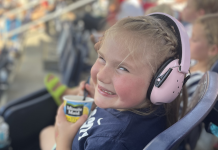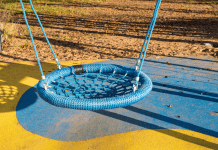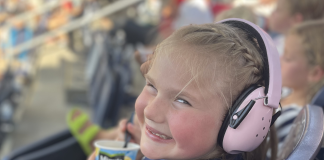This post is sponsored by Children’s Mercy Kansas City.
Now that kids are back in school, progress reports and parent-teacher conferences will be here before you know it.
Over the past decade, one topic that has received a lot of media attention and is routinely part of school conversations is ADHD (attention-deficit/ hyperactivity disorder). Sometimes the media stories give families helpful knowledge, and other times it can cause confusion or fear about this common diagnosis. Here’s what you really need to know about ADHD.
What is ADHD?
ADHD is the feeling when you can’t pay attention for a long time, feel overly active, or have trouble controlling your impulses. The official medical definition for ADHD is: the condition in which a person experiences a persistent pattern of inattention and/or hyperactivity impulsivity that interferes with their functioning or development.
If your child is diagnosed with ADHD, they could experience one of three types:
ADHD with mostly inattentive symptoms
Trouble staying on task, not listening to directions or trouble keeping their attention.
ADHD with mostly hyperactive or impulsive symptoms
Restlessness, always fidgeting, tough time staying still or always needing to move, jump or climb. The impulsiveness may show like they are not able to wait, or being overly emotional to situations.
ADHD with symptoms of both inattention and hyperactivity
This would be a combination of those symptoms.
How common is childhood ADHD?
ADHD is a very common childhood diagnosis. According to a National Health Interview Survey in the years 2011 to 2013, 9.5% of children in the United States would qualify for a diagnosis. Boys are two to three times more likely than girls to be diagnosed. Because ADHD has a genetic component, it is possible that if one or more people in the family has ADHD, your child may be at higher risk of also showing symptoms. Risk factors for developing ADHD could also include developmental medical conditions, drug use during pregnancy, or premature birth.
How is childhood ADHD diagnosed?
Typically, your child’s pediatrician can make the diagnosis or they may refer you to a trained psychiatrist or psychologist who evaluates your child. They will assess your child by looking at their behavior, medical history and health checks. Information from you, the parents or caregivers and teachers, will also be helpful to monitor your child’s symptoms over time. If you have concerns about your child, it is best to discuss them with their pediatrician and they can refer you to the appropriate specialists.
Each type of ADHD has its own unique standards for diagnosis. In order to qualify, a child needs to show at least six of the nine symptoms associated with the ADHD type for at least six months and in at least two different settings, like at home, at school or in extracurricular activities.
For ADHD with inattentive symptoms, a child can show at least six of these symptoms.
- Makes careless mistakes.
- Can’t sustain attention on tasks.
- Does not listen when spoken to directly.
- Does not follow through on instructions.
- Difficulty organizing tasks.
- Avoids tasks that require sustained mental effort.
- Often loses things.
- Easily distracted.
- Forgetful in daily activities.
For ADHD with hyperactive or impulsive symptoms, a child must show at least six of these symptoms.
- Fidgets and squirms.
- Can’t sit still.
- Runs or climbs at inappropriate times.
- Can’t stay quiet.
- Always “on the go.”
- Talks excessively.
- Blurts out answers.
- Difficulty waiting on their turn.
- Often interrupts.
For ADHD of the combined type, a child must exhibit six or more symptoms of the inattentive type AND six or more symptoms of the hyperactive or impulsive type.
Also, for any of the types, ADHD symptoms must start to show before the age of 12, must interfere with social, academic and daily living activities, should be inconsistent with the child’s developmental age, and cannot be better explained by another mental disorder such as depression or anxiety. So, there’s quite a high bar when a doctor is looking to make an ADHD diagnosis.
Sometimes, results of an evaluation are unclear about whether a child’s symptoms are due to ADHD or another issue such as anxiety, depression, sleep deprivation or excessive screen time. While screen time does not cause ADHD, it can show as similar symptoms in children. In that case, more testing may be needed. Keep in mind it’s common for ADHD to occur with other disorders.
What treatments are effective for kids with ADHD?
The right treatment for ADHD depends on the age of the child and the way their symptoms affect them. A combination of medicine and behavioral supports can often be helpful.
Medication treatment for ADHD in kids
Core symptoms of ADHD are best treated with medications known as stimulants. Stimulants work by increasing the natural brain chemicals norepinephrine and dopamine, which help increase focus and decrease impulsive behavior. Stimulants come in different forms such as tablets, capsules and liquid. The effectiveness of a dose can last anywhere from four to 16 hours.
When these medications are used as intended for ADHD, it is unlikely that kids are put kids at increased risk for substance abuse. If anything, it could reduce the likelihood children will self-medicate and harm themselves with other substances in an attempt to relieve symptoms. It is worth considering that, while medications come with risks, not treating ADHD is also a risk.
Non-stimulant medications for ADHD also exist and can be helpful for ADHD symptoms on their own, or in combination with stimulants.
Behavioral and environmental strategies for kids with ADHD
Adding behavioral therapies to a medication treatment can help with improved behavior, anxiety, improved grades, social skills and parent-child relations. Many children find help through skill development, anger management or special school accommodations such as an individualized education plan (IEP) or 504 plan. If your child has been diagnosed with ADHD, try to speak with teachers, school counselors, coaches and other caring adults about how to set up your child for success.
For children younger than 6 years old, parent training in behavioral management is the first line of treatment before medication because younger children often have more side effects to ADHD medication.
Caregivers can do a few things to help their children succeed like:
- Sticking to a routine.
- Minimizing distractions such as noises, electronics and bright lights.
- Offering limited choices to prevent any overwhelming decisions.
- Communicating clearly and being specific when talking with the child.
- Helping the child get organized.
- Offering age-appropriate rewards for positive behavior.
- Disciplining effectively and with natural consequences.
- Providing a healthy lifestyle with nourishing food, physical activity and sleep.
ADHD services at Children’s Mercy
Attention-deficit/ hyperactivity disorder (ADHD) is a common concern—as many as 1 in every 10 children have a diagnosis of ADHD. The best place to start if you have concerns about ADHD is your child’s pediatrician or primary care provider. In most cases, they can use rating scales and additional input from you and your child’s teacher to assess and diagnose your child in their office.
Your primary care provider can also determine if your child has complexities that may require additional support from a specialist. If your child is having trouble at school, ask school staff members about services or supports your child may qualify for to help them in the school setting. You can also work with your school district to create a support plan for your child.
Children’s Mercy ADHD specialists include clinical psychologists, developmental pediatricians, behavior analysts, nurse practitioners and child and family therapists. Your child may receive care from one or more of these types of specialists, depending on their specific needs. We offer care for families with children who have complex ADHD.
Click here to learn more and see what resources Children’s Mercy has available.
















